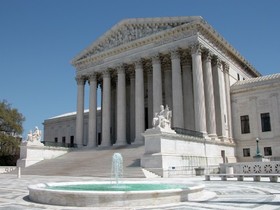The opinion (PDF) handed down by the U.S. Supreme Court today in the case of Caperton v. A.T. Massey Coal Co. et al sounds like a no-brainer, yet the court split 5-4 on ideological lines (Roberts, Thomas, Alito and Scalia dissented).
The question was simple: Is it unconstitutional for a state supreme court justice to sit on a case which involves the financial interests of a major donor to the judge’s election campaign?
Well, let's ask that in layman's terms. Suppose you were in a court case with someone (either as plaintiff or defendent), and the person you are opposing was a HUGE campaign contributor to the judge hearing your case. Should the judge disqualify himself?
The majority said disqualification was required taking into account “all of the circumstances of this case.”
Seems straightforward to me. Our legal system doesn't work if judges have — or even appear to have — partiality and bias. They really shouldn't sit on the bench for cases where one of the parties was a major contributor to their judicial campaign.
Of course, I don't think judges should have to campaign for the position anyway.
UPDATE: More background on the case….
The West Virginia case involved more than $3 million spent by the chief executive of Massey Energy Co. to help elect state Supreme Court Justice Brent Benjamin. At the same time, Massey was appealing a verdict, which now totals $82.7 million with interest, in a dispute with a local coal company. Benjamin refused to step aside from the case, despite repeated requests, and was part of a 3-2 decision to overturn the verdict.
Yikes. Oddly enough, both Scalia and Roberts said that the ruling would end up undermining confidence in the judicial system, not enhancing it as the majority contended.

